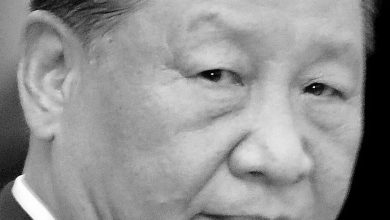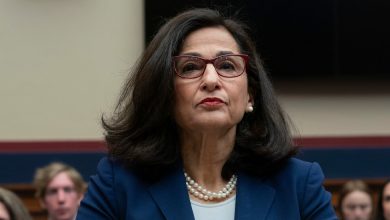In Virginia Governor’s Race, Biden Barely Rates a Mention

RESTON, Va. — In Terry McAuliffe’s tough fight for a new term as Virginia’s governor, he has been striving to frame the election as a referendum on a president.
Just not the one who is currently sitting in the Oval Office.
For weeks, Mr. McAuliffe has made little mention of President Biden, instead using his campaign rallies, media interviews and millions of dollars in campaign advertising to make the race all about former President Donald J. Trump.
In a way, Mr. Biden’s scheduled campaign stop with Mr. McAuliffe Tuesday evening, as part of a last-week effort to energize Democratic voters, highlights just how little he has been present in the race at all.
The delicate distance Mr. McAuliffe has put between his campaign and the president, his friend of four decades — whom Mr. McAuliffe helped carry Virginia by 10 points just a year ago — underscores a difficult reality for Democrats looking anxiously ahead to the midterm elections next year. With his moderate, art-of-the-possible politics, Mr. Biden fails to rouse anywhere near the same passions as Mr. Trump, who spurred Democrats to the polls in record numbers throughout his four years in office. Nor has Mr. Biden’s administration given Mr. McAuliffe much to advertise, after months of Democratic infighting on Capitol Hill over the president’s dwindling domestic ambitions.
Rather, in an off-year election with outsize national importance, Mr. Biden has loomed as the unnamed president just offstage: largely ignored in favor of his predecessor, though his own performance is a major factor in the closeness of the race and could play a big role in its outcome.
Democrats reject the idea that the race is a referendum on Mr. Biden’s presidency, but there is widespread acquiescence to the idea that the party’s fortunes are yoked to his standing — a shift in strategy from the 2010 and 2014 midterms, when a number of Democratic candidates for competitive seats distanced themselves from former President Barack Obama. This, in turn, has sent waves of anxiety through Democratic circles, as lawmakers prepare for what are expected to be difficult congressional campaigns in 2022.
“I don’t know if it’s a referendum on Biden, exactly — it’s just a general feeling of not understanding why nothing can get done,” said John Morgan, a Florida trial lawyer and top donor to both Mr. Biden and Mr. McAuliffe. He said he largely blamed congressional Democrats for the tightening of the Virginia race.
“The party is single-handedly torpedoing Terry McAuliffe,” Mr. Morgan said. “And I think that if Terry loses, Democrats just need to grab a hold of themselves, because the midterms are going to be a blood bath.”
Virginia’s off-year elections do not always accurately foreshadow the midterm results: Mr. McAuliffe won in 2013, defying the state’s pattern of electing a governor from the party that does not hold the White House, yet Republicans won the midterms the following year. And many fatigued Democratic voters now simply want to tune out national politics altogether.
But strategists in both parties say Mr. Biden’s early struggles and the lack of enthusiasm around his presidency could be a decisive factor.
“The overriding factor in the environment is not Donald Trump, it’s Biden’s approval rating,” said Tucker Martin, a Republican strategist in Richmond who voted for Mr. Biden but plans to support Glenn Youngkin, a Republican and former private equity executive, over Mr. McAuliffe. “Both these candidates, they’re really captive to the national political environment. That’s the reality.”
Advisers to Mr. McAuliffe note that his contest with Mr. Youngkin tightened at the end of the summer, just as Mr. Biden’s approval rating began to fall, as the president’s promise of a return to normalcy faltered in the face of the Delta variant, chaos on the southern border and the tumultuous withdrawal from Afghanistan.
But they see hopeful signs in the fact that Mr. McAuliffe’s support remains higher than Mr. Biden’s approval rating, which hovers in the low to mid-40s — lower than that of any president than Mr. Trump at this early stage.
Mr. Biden’s declining approval ratings among core Democratic constituencies, including young, Latino and Black voters, could inhibit turnout efforts for Mr. McAuliffe, complicating his path to victory in a race that could hinge on which candidate best mobilizes his base.
Swing voters in the suburbs have gotten over their early excitement about replacing Mr. Trump, said Christine Matthews, a Republican pollster who has run focus groups about the Virginia contest. While Mr. Biden’s victory at first inspired “ginormous relief,” she said, “Now, there’s a realization like, Oh, yeah, Biden’s not perfect, and things aren’t feeling enormously better.”
Neither Mr. McAuliffe nor Mr. Youngkin has mentioned Mr. Biden in his ads, according to AdImpact, which tracks campaign commercials, underscoring how little he motivates voters in either party — a striking change after many years in which sitting presidents routinely played starring roles in advertisements by candidates in both parties.
In the closing weeks of the race, Mr. McAuliffe, who served a term as governor from 2014 to 2018 but was barred from a second consecutive term by Virginia law, has tried to put some daylight between his campaign and Mr. Biden’s administration. Though he never directly criticizes the president, Mr. McAuliffe has repeatedly highlighted the political risk posed by congressional inaction on the president’s legislative agenda. In private conversations with House Speaker Nancy Pelosi and the White House, allies of Mr. McAuliffe say he has argued that the souring national environment is hurting his chances.
“We are facing a lot of headwinds from Washington,” Mr. McAuliffe, a former chairman of the Democratic National Committee, said during a virtual call with supporters this month. “As you know, the president is unpopular today, unfortunately, here in Virginia, so we have got to plow through.”
Mr. McAuliffe downplayed the remark, saying he was referring to a general sense of frustration with inaction in Washington. But it was a sharp departure from earlier in the race when Mr. McAuliffe predicted his state would “take off like a booster rocket” if he was elected governor and could work with Mr. Biden.
The tonal shift is particularly striking, given the long friendship between the two men and the similarities in their political brands as experienced party insiders with centrist leanings. Mr. McAuliffe declined to run for president in April 2019 after a three-hour dinner with Mr. Biden during which the future president laid out his path to victory — one based on the same kind of consensus-oriented platform that Mr. McAuliffe had envisioned for himself.
“I love the guy,” Mr. McAuliffe said of Mr. Biden at the time. “I’m a big fan.”
Mr. Biden’s promises to move past polarizing politics helped him win the White House, offering a refuge for voters tired of the turbulence of the Trump era. Now, however, at a moment when Democrats need to marshal their forces, the prospect of calm leadership and a diminished agenda may not be so enticing to his Democratic base.
Wes Bellamy, a co-chair of Our Black Party, which promotes the political priorities of Black voters, said Mr. Biden was not inspiring the same sort of loyalty from Black voters that Mr. Obama did.
“Black folks came out in droves for the Biden administration,” said Mr. Bellamy, a former Charlottesville city councilman who was named to a statewide education post during Mr. McAuliffe’s first term. “And there has been a lot of people who really feel the administration hasn’t delivered on many of the things they wish they did.”
To animate Democrats, Mr. McAuliffe has spent millions tying Mr. Youngkin to Mr. Trump, portraying the former president as a grave and continuing threat to democracy and to Democratic values like abortion rights.
But some party strategists say it is not enough for Democrats to campaign on what they can block; with control of Congress and the White House, they need to be able to run on what they have accomplished.
“The lack of base intensity is based on Democrats not delivering, after people spent four years resisting Trump and getting Democratic majorities,” said Tom Perriello, a Virginia Democrat who lost his seat in Congress after supporting Mr. Obama’s health care law in 2010 and blamed congressional moderates for stalling passage of Mr. Biden’s legislative agenda.
Yet some Democrats worry that any distinction between the president and the party’s dueling factions in Congress will be lost on voters.
“In America we’ve loved to shoot the messenger, and the messenger is always the president,” said Mr. Morgan, the Democratic donor. “We can’t shoot Trump. He’s gone. So you can either blame Biden or God.”




